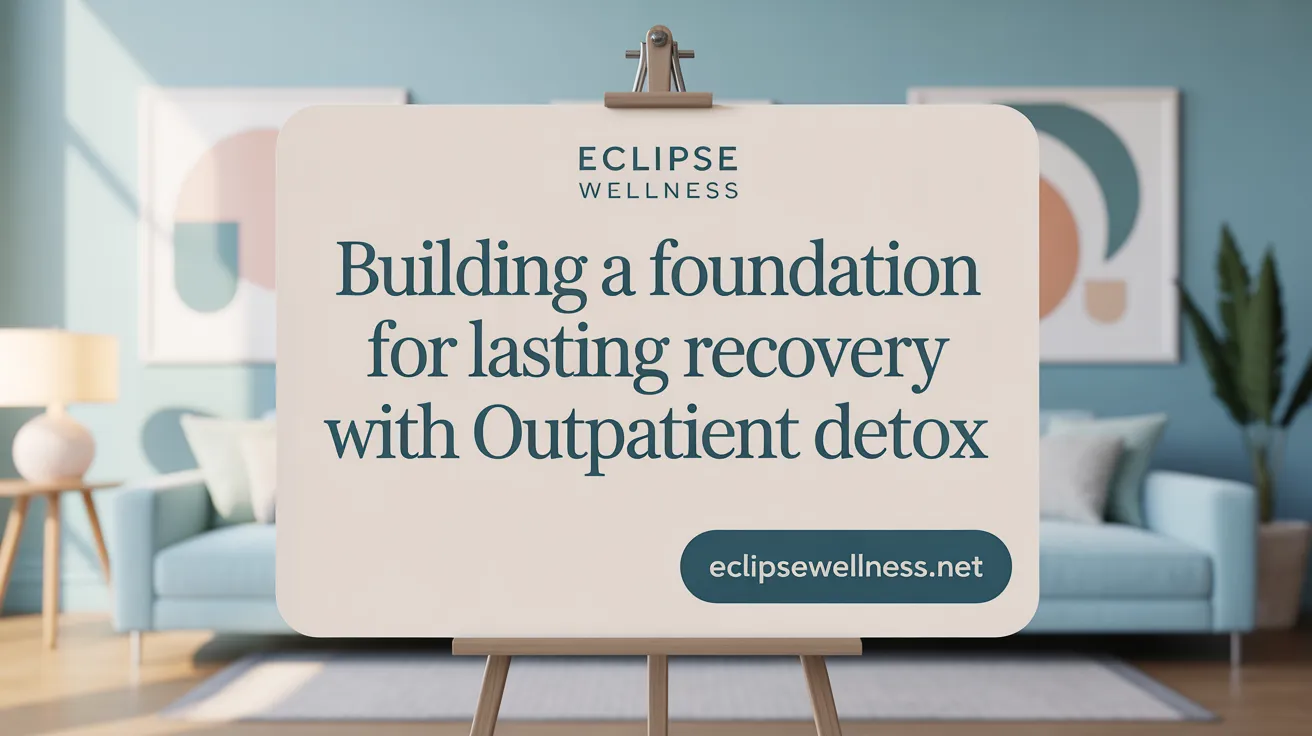Understanding Outpatient Detoxification
Outpatient detox services offer a medically supervised approach to managing withdrawal symptoms while allowing patients to live at home and maintain daily responsibilities. This form of treatment combines personalized medical care, counseling, and support systems to facilitate a safer, more comfortable recovery experience. By addressing physical, psychological, and social needs, outpatient detox plays a critical role as the initial step in the continuum of addiction treatment.
The Essential Role of Medical Supervision in Outpatient Detox

Why is medical supervision crucial during outpatient detox?
Medical supervision during outpatient detox significantly reduces risks associated with withdrawal, including seizures, severe symptoms, and potential medical complications. This supervision ensures that patients receive appropriate medications to manage cravings and withdrawal symptoms, creating a safer and more comfortable recovery journey. Without such oversight, individuals face increased dangers due to the unpredictable nature of withdrawal.
Ensuring Safety During Withdrawal
Withdrawal is a physically and psychologically challenging phase that can result in symptoms ranging from anxiety and nausea to potentially life-threatening issues like seizures. Medical professionals carefully monitor patients throughout the detox process, adjusting care plans promptly if symptoms intensify. This proactive approach minimizes health risks and supports patient stability as detailed in medically supervised detoxification.
Medication Management
Medications play a vital role in mitigating withdrawal symptoms and easing the transition to sobriety. Prescribed drugs, such as benzodiazepines for alcohol withdrawal or buprenorphine for opioids, are administered under medical guidance. This tailored use helps prevent complications and improves the likelihood of detox completion. For more on medication-assisted treatment (MAT) and medication management, see related resources.
Individualized Detox Plans
Each patient's detox experience is unique, influenced by factors like substance type, usage severity, and overall health. Medical teams conduct thorough assessments to develop personalized treatment plans that address specific needs. This individualized approach maximizes treatment effectiveness while balancing the patient’s lifestyle needs.
Outpatient detox, when conducted under medical supervision with structured medication management and customized treatment plans, supports a safer and more effective pathway to recovery while allowing patients to maintain daily responsibilities. Learn more about outpatient detox programs and their benefits.
Advantages of Outpatient Detox Over Inpatient Programs

What benefits does outpatient detox offer compared to inpatient care?
Outpatient detox provides several notable advantages over inpatient programs, making it an appealing choice for many individuals seeking recovery. For a detailed look at Outpatient detoxification programs.
Flexibility and Convenience of Outpatient Detox
Outpatient detox allows patients to attend scheduled treatment sessions while continuing their daily activities. Unlike inpatient care, which requires a stay at a treatment facility, outpatient patients can maintain their routines without interruption. This flexibility supports those who need to manage work, school, or family responsibilities alongside recovery. Learn more about Flexible recovery options.
Cost Considerations
Outpatient detox is generally more affordable than inpatient programs. Without the need for overnight accommodation or full-time medical supervision, costs associated with facility stays are minimized. This makes outpatient care accessible to a broader range of individuals and eases financial burdens. See benefits discussed in Cost advantages of outpatient detox.
Maintaining Daily Life and Responsibilities
One of the core benefits of outpatient detox is the ability to live at home during treatment. Patients can care for their families, maintain employment, and uphold social commitments. This continuity helps reduce the emotional stress often associated with inpatient stays and supports a smoother transition to long-term recovery. More on Living at home during treatment.
Home Environment Benefits
Staying in a familiar home environment provides comfort and emotional stability. Patients benefit from the support of family and friends, which can enhance motivation and resilience during detox. The home setting also reduces feelings of isolation and anxiety, important factors in managing withdrawal symptoms effectively. Read about Family education and support groups.
Privacy and Comfort
Outpatient detox offers greater privacy compared to inpatient facilities. Patients avoid the communal living arrangements of inpatient programs, allowing for individualized care without the added stress of shared spaces. This privacy contributes to a more comfortable detox experience, promoting engagement and adherence to the treatment plan. For more details on Privacy in outpatient programs.
Overall, outpatient detox combines medical supervision with the flexibility of home life, making it a safe, cost-effective, and patient-centered approach to beginning the recovery journey. For comprehensive info on Personalized outpatient detox treatment.
Who Is an Ideal Candidate for Outpatient Detox?

What criteria determine suitability for outpatient detox?
Outpatient detox is designed for individuals who experience mild to moderate withdrawal symptoms and can safely manage their detoxification without 24-hour supervision. Candidates should have a stable home environment that supports sobriety and provides comfort during the recovery process. This model of detoxification offers flexibility, allowing patients to maintain daily activities such as work or family responsibilities.
What level of withdrawal symptoms qualifies for outpatient detox?
Individuals with mild to moderate withdrawal symptoms—such as manageable nausea, anxiety, tremors, or mood swings—are typically considered ideal for outpatient detoxification. Those experiencing severe withdrawal symptoms, including seizures or delirium tremens, generally require inpatient care due to the risk of medical complications.
How important is a stable home environment?
A supportive and stable home environment is crucial for successful outpatient detox. It ensures that individuals have a safe place to recover and access to emotional encouragement from family or friends. Additionally, candidates should have reliable transportation to attend daily or regular treatment visits.
What role does involvement of support systems play?
Support system involvement, including family education and peer support, enhances the individual's chances of completing detox successfully. Outpatient programs often encourage loved ones to participate in counseling and recovery sessions, which helps maintain motivation and accountability. This is part of individualized addiction treatment and family education and support groups.
Are there medical or psychiatric considerations?
Patients should not have severe medical or psychiatric conditions that require constant monitoring or specialized inpatient care. Those with co-occurring mental health disorders may still qualify for outpatient detox if these conditions are stable and appropriately managed. A thorough medical evaluation is performed to determine individual eligibility and to tailor a personalized treatment plan.
| Criteria | Description | Importance |
|---|---|---|
| Withdrawal Severity | Mild to moderate symptoms manageable outpatient | Essential for safety |
| Home Environment | Stable, supportive, and safe | Critical for recovery comfort |
| Support System | Active family and peer involvement | Enhances treatment adherence |
| Medical & Psychiatric Status | Absence of severe complications or instability | Ensures appropriate care level |
Individuals best suited for outpatient detox include those motivated to follow medical advice, with a strong support network and no severe health risks. This setting offers a safe, medically supervised detox path to recovery while allowing continuity of daily life.
Comprehensive Care in Outpatient Detox Programs
What components make up outpatient detox programs?
Outpatient detox programs are designed to provide comprehensive, individualized care tailored to each patient’s unique needs. A thorough assessment forms the foundation, guiding a personalized treatment plan that integrates multiple therapeutic components.
Medication-assisted treatment (MAT) is a cornerstone, employing medications like buprenorphine, naltrexone, or benzodiazepines to safely manage withdrawal symptoms, reduce cravings, and stabilize physical health during detox.
Behavioral therapies and counseling play a vital role. Patients participate in individual counseling, group therapy, and support groups to address the psychological and emotional aspects of addiction. These sessions enhance coping strategies and prepare patients for sustained recovery.
Family involvement and support are emphasized, recognizing that addiction affects the entire family. Educating loved ones and involving them in therapy fosters a supportive environment crucial for long-term success.
Holistic and specialized therapies supplement standard care. Techniques such as transcranial magnetic stimulation (TMS), mindfulness practices, and other holistic approaches help address co-occurring mental health conditions and improve overall well-being.
Together, these components create a multidisciplinary approach that improves comfort and safety during detox while preparing individuals for the next stages of recovery.
Addressing Challenges and Risks in Outpatient Detox
What challenges are associated with outpatient detox, and how are they managed?
Outpatient detox offers a flexible recovery option for individuals with mild to moderate withdrawal symptoms, but it comes with specific challenges. One of the main risks is a higher chance of relapse, often because patients have easy access to alcohol or drugs at home, increasing temptation during vulnerable moments.
Another significant challenge is the potential for missed appointments. Since treatment does not involve overnight stays, patients must manage their schedules actively, and gaps in attendance can undermine treatment progress. Additionally, the less intensive supervision compared to inpatient settings means withdrawal symptoms might not be as closely monitored, which could delay intervention if complications arise. For this reason, programs emphasize medical supervision during withdrawal and medication management in outpatient detox, ensuring safety with ongoing medical check-ups and withdrawal symptom management.
To address these issues, outpatient programs employ strategies such as thorough medical and psychological assessments to ensure candidates are suitable for this level of care. Treatment plans are personalized and include scheduled therapy sessions (individual and group), medication-assisted treatment (MAT), and regular medical check-ins to monitor withdrawal symptoms.
Family involvement is encouraged to create supportive home environments, and outpatient programs often connect patients with community resources and peer support groups like Alcoholics Anonymous (AA) or Narcotics Anonymous (NA). These measures help improve adherence, provide accountability, and foster a network of encouragement critical for long-term recovery success.
Supporting Long-Term Recovery Through Outpatient Detox

How does outpatient detox facilitate lasting recovery?
Outpatient detox plays a foundational role in supporting long-term recovery by providing medically supervised detoxification in a safe, flexible setting. This initial phase stabilizes patients physically, mitigating withdrawal symptoms with personalized medication and monitoring, which prepares them effectively for subsequent treatment stages. Research on medical detox overview and personalized detox plans highlights how continuous medical support benefits detox success and lays the foundation for lasting recovery.
Why is the transition from detox to treatment critical?
Successful transitions from outpatient detox to ongoing addiction treatment are essential. A well-managed handoff reduces relapse rates by ensuring individuals continue with therapy, counseling, medication-assisted treatment (MAT), and peer support. Comprehensive discharge planning, patient education, and coordinated care facilitate this seamless progression. Studies on transitioning from detoxification to substance use treatment emphasize how effective transition management benefits patients and reduces barriers to treatment.
What role do ongoing therapy and support groups play?
Outpatient detox is just the start; sustained recovery benefits greatly from continued engagement in individual and group therapy. Support groups such as Alcoholics Anonymous (AA) or Narcotics Anonymous (NA) extend social reinforcement. Combined with behavioral therapies—like Cognitive Behavioral Therapy (CBT)—these services build coping skills and maintain motivation, which are crucial for relapse prevention. Outpatient programs typically include individualized addiction treatment and are supported by certified recovery specialists.
How important is family and community involvement?
Family education and involvement empower loved ones to provide encouragement and a stable support network. Family education and support groups and community resources help reduce stigma and foster a recovery-oriented environment. These connections support emotional wellbeing, accountability, and a stronger foundation for long-term sobriety, as emphasized by peer support and case management services and community collaboration for recovery.
By integrating outpatient detox with ongoing therapy, support groups, and active family-community engagement, individuals gain a comprehensive continuum of care that promotes lasting recovery and improved quality of life.
Personalizing Recovery: Tailoring Outpatient Detox to Individual Needs
Why is personalization important in outpatient detox?
Personalization in outpatient detox is vital because it allows treatment to be specifically tailored to each individual's unique situation. This includes their patterns of substance use, the severity and type of withdrawal symptoms, mental health conditions, and social circumstances. By customizing treatment plans, individuals are more likely to engage fully, adhere to therapy, and experience better recovery outcomes. For more on individualized addiction treatment and personalized treatment plans, see these resources.
Assessment-based Treatment Planning
Outpatient detox programs begin with comprehensive assessments including physical exams, lab tests, and mental health evaluations. These assessments guide the creation of personalized care plans, ensuring medications and therapies directly address the patient's specific withdrawal challenges and health needs. Comprehensive approaches to medical supervision during detox and personalized detox treatment plans provide insight into effective assessment processes.
Addressing Dual Diagnosis
Many individuals experience co-occurring mental health disorders alongside substance use. Effective outpatient programs integrate dual diagnosis treatment, offering simultaneous care for both addiction and mental health to tackle underlying issues and prevent relapse. Learn more about dual diagnosis treatment options and integrated care for mood and anxiety disorders.
Adaptability and Integration
Outpatient detox programs are designed to be flexible and adaptive, adjusting treatments as patients progress. Integration of mental health and addiction services ensures a holistic recovery approach, combining medication management, behavioral therapy, and support systems in a cohesive plan. Explore resources on flexible recovery options, holistic approaches to addiction recovery, and comprehensive inpatient and outpatient care for a broad perspective.
Personalized outpatient detox, therefore, embraces individualized care and the integration of mental health services to offer a safer, more effective path to recovery. For additional details on medically supervised detoxification and patient-centered, evidence-based addiction treatment, these resources can be consulted.
Outpatient Detox: A Safe, Flexible, and Effective Start to Recovery
Outpatient detox services provide a vital, medically supervised pathway for individuals beginning the journey to sobriety. By balancing safety with flexibility, these programs allow patients to maintain their everyday lives while receiving tailored medical and therapeutic care. Through comprehensive assessments, medication management, and strong support systems involving family and community, outpatient detox not only facilitates a safer and more comfortable withdrawal experience but also fosters ongoing engagement in recovery. As a foundational first step, outpatient detox paves the way for lasting treatment success and improved quality of life for those overcoming substance use disorders.
